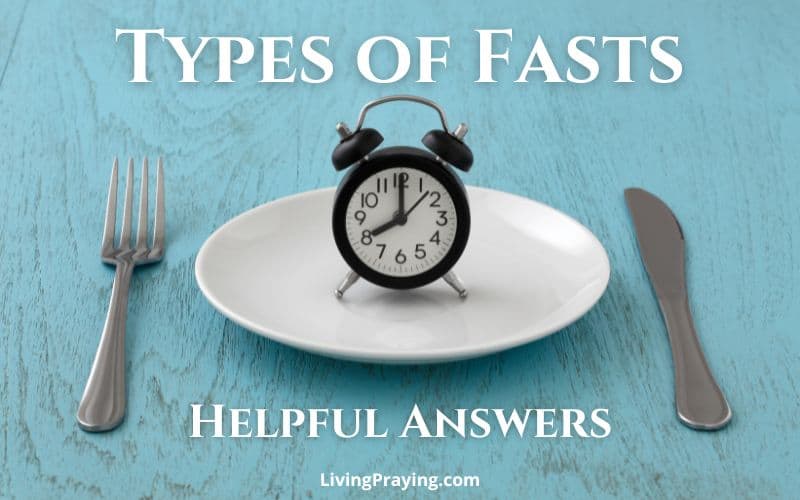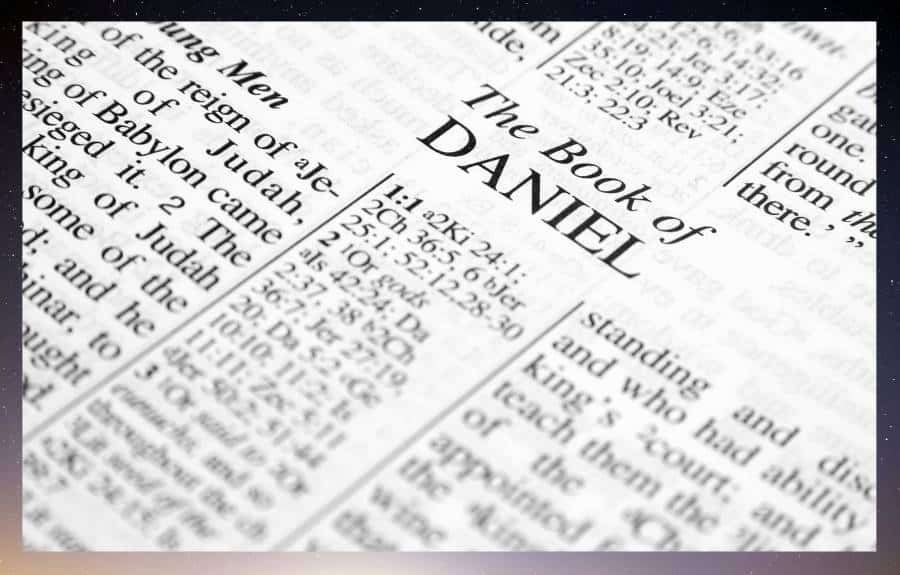You may have heard about fasting and the many benefits it offers. But what are the different types of fasts? And how can they benefit you? In this article, we will discuss the different types of fasting and how they can help you improve your health and well-being. We will also explore the types of fasting mentioned in the Bible, as well as the types of fasting that are recommended for health only. If you’re interested in starting a fast, but aren’t sure which type is right for you, this article will help!

What Actually Does it Mean To Fast?
The act of fasting is normally referred to as abstaining from food in general, or certain types of food or beverage primarily for religious reasons or health reasons. Someone may choose to fast for a specific length of time, from particular types of food or drink, or some may fast from various life practices (such as social media, television, etc). Fasting can produce positive health benefits and/or help you focus your mind on spiritual practices such as prayer or meditation.
Although the primary meaning of fasting from various scriptural texts involves some sort of abstaining from the intake of food, people have extended that to mean abstaining from all types of behavior. We will talk about those as well. However, first – let’s take a look at the more traditional types of fasting.

The Purpose of Fasting
Although there are some who fast only for physical or health purposes, many people do so for religious or spiritual reasons. You might find this book by Pastor Jentezen Franklin helpful.
From a Christian perspective , the act of denying food to yourself or denying only certain types of food serves to remind you what your true purpose is – to have a growing relationship with God. From experience, I can tell you that fasting seems to heighten your sense of spiritual awareness in some way.
[amazon box=”1616385847″]
We see Moses fasting as God was giving him the ten commandments. We look over into the book of Ezra as he proclaimed a fast so that they might humble themselves before God and seek His protection.
“Then I proclaimed a fast there, at the river Ahava, that we might humble ourselves before our God, to seek from him a safe journey for ourselves, our children, and all our goods.”
Ezra 8:21
If you use the time of fasting to incorporate more prayer, more scripture reading, Bible study, or meditating on the scripture it can impact your spiritual life in a great way.
Many Christians will enter into a time of fasting when they are seeking an answer from God concerning a big decision or seeking direction in their lives. You may fast when you are seeking a job or when you have a big financial need in your life. There are a number of reasons that you may choose or sense the need to fast. Let’s take a look at a few types of fasts.
What Are the Various Types of Fasting?

Types of Fasts – The Regular Fast or Traditional Fast
This is a type of fasting in which people may choose to abstain from all food for a limited number of days. You would find this type of fast would mean that the person would simply abstain from food during that time.
However, most people during this type of fast would still drink water or perhaps juice of some sort during a regular fast. If you remember when Jesus fasted forty days and nights as told in Matthew 4 in the Bible, it mentions that “he was hungry.” There is no mention of Jesus being thirsty.
“Then Jesus was led by the Spirit into the wilderness to be tempted there by the devil. For forty days and forty nights he fasted and became very hungry.”
Matthew 4:1-2
So, it’s very likely that he drank as he needed during those forty days. It would be very dangerous, if not fatal, for someone to try to fast from liquids for that amount of time. The human body can last much longer without food than it can without liquid. So, as you fast, we would encourage you to at least drink water through your fast.
There are some people, many of them for religious reasons, who will attempt a 40-day fast. This should best be monitored by a doctor. Many times those who choose to do a 40-day fast will supplement with fruit and vegetable juices to help them maintain as much physical strength as possible during the forty days.
Although a 40-day fast is looked upon as a major fast that only a very small number of people will attempt, you can still do a traditional or complete fast. A 3-day traditional fast is fairly common. I’ve seen people do those quite a few times and have done so myself. To me, a traditional fast is a fairly hard way to fast.
Types of Fasts – A Partial Fast
For our purposes here, we will identify a partial fast as one in which you set aside a portion of a day or number of days (many times for spiritual purposes) and fast only for a specific portion of the day. Some Christians will suggest that a partial fast will begin at 6:00 am and end at 3:00 pm. Others may choose another time during the day in which to fast. During the 30 days of Ramadan, Muslims will fast from sunrise to sunset.

Types of Fasts – The Daniel Fast
Anytime evangelical Christians talk about the various types of fasts they couldn’t go very far into a summary on fasting before we mentioned what has become this very popular type of fast in our culture. The Daniel fast is incorporated by many individuals and church groups every year.
The Daniel fast is taken from the Old Testament and used by Daniel in the book of Daniel. He demonstrated that he ate no meat or no “‘rich food” for a period of 3 weeks.
[amazon box=”1414334133″]
Daniel had already asked that his men be exempted from some of the rich foods the king’s men were allowed to eat in Daniel chapter 1. Daniel’s men were healthier for it. In terms of the 21-day time period, we get that from the 10th chapter of Daniel.
All that time I had eaten no rich food. No meat or wine crossed my lips, and I used no fragrant lotions until those three weeks had passed.
Daneil 10:3
For those who participate in a modern-day Daniel fast, they only eat fruit, vegetables, legumes, whole grains, nuts, and seeds. They avoid all meats, dairy, and sugars. Some drink only water while sometimes they will drink certain types of juice.
The Daniel Fast is not one that necessarily limits the amount of food you can eat. Rather than making you feel the pains of hunger so much in a Daniel Fast, it does limit the pleasure that you may have from certain types of foods and can certainly help you as you focus on prayer and your spiritual life. It will provide you with a healthy choice of food and many will experience weight loss as well. A Daniel Fast lasts for 21 days.
Types of Fasts – A Full Fast – Total Abstinence From Food Or Liquid.
This is a type of fast that should only be entered into with extreme caution. It may be called by other names, but what we refer to here is a full fast where no food or drink is consumed.
There are examples in the Bible where a full fast was done. You fill find this specifically in Acts 9 after Paul had a supernatural encounter with Jesus as Paul was traveling to Damascus.
“Saul picked himself up off the ground, but when he opened his eyes he was blind. So his companions led him by the hand to Damascus. He remained there blind for three days and did not eat or drink.”
Acts 9:8-9
You can also find that Esther called for this kind of fast when she was getting ready to go before the king to ask him to spare the life of the Jewish people. Esther was endangering her life going in to see the King without being summoned. She understood the danger and this was her request:
“Then Esther sent this reply to Mordecai: “Go and gather together all the Jews of Susa and fast for me. Do not eat or drink for three days, night or day. My maids and I will do the same. And then, though it is against the law, I will go in to see the king. If I must die, I must die.” So Mordecai went away and did everything as Esther had ordered him.”
Esther 4:16
This type of fast should be over a very limited period of time and done with extreme caution.

Types of Fasts – Intermittent Fasts
The intermittent fast is now an extremely popular trend in the world of health and fitness. People participate in intermittent fasting to improve their health and even to simplify their lifestyles.
There have been studies that show that intermittent fasting can have a powerful and positive effect on your brain and your body. Some believe that its overall effects can bring you a longer life as well.
Intermittent fasting is a dietary pattern that cycles between periods of fasting and eating. It doesn’t necessarily specify which foods you should eat, but rather when you should eat them. There are several types of intermittent fasting, each with its own rules on when to fast and for how long.
[amazon box=”B08NHR8YFP”]
Some people do what is called a 16/8 method. It’s a 16-hour fast followed by an eight-hour eating window. Others do a 14/10 method – a 14 hour fast followed by a ten-hour eating window.
There is also the 5:2 method, or “twice per week” method. Using this method you would cap your caloric intake at 500 for 2 days per week. During the other 5 days, you would eat a diet that is healthy and normal. However, on the fasting days, those would include a 200 calorie meal (is there such thing?) and a 300 calorie meal. During those two days of fasting, you should focus on high fiber and high protein foods.
You can choose whichever two fasting days (say, Tuesdays and Thursdays) as long as there is a non-fasting day between them. Be sure to eat the same amount of food you normally would on non-fasting days.
The Sexual Fast
This is one that is mentioned in the Bible for married couples. It is when the married couple decides that they will abstain from sexual relations for a period of time.
Let’s go directly into the scripture on this one!
“The husband should fulfill his wife’s sexual needs, and the wife should fulfill her husband’s needs. The wife gives authority over her body to her husband, and the husband gives authority over his body to his wife.
Do not deprive each other of sexual relations, unless you both agree to refrain from sexual intimacy for a limited time so you can give yourselves more completely to prayer. Afterward, you should come together again so that Satan won’t be able to tempt you because of your lack of self-control. I say this as a concession, not as a command.”
1 Corinthians 7:3-6
This type of fasting is rarely mentioned in the Bible and I guess a lot of married people are thankful for that! This type of abstinence from sex for a married couple was only for a time of setting aside the sexual relationship on a temporary basis through mutual consent so the couple could devote themselves to prayer and seeking God in a more focused way.

Types of Fasts – Fasting From Material Possessions or Habits
These are types of habits that aren’t necessarily mentioned in the Bible. That doesn’t mean they are wrong. Should they be labeled as fasting? I don’t know, but I don’t think God is really worried about it if the person is sincere.
The types of things that would be given up or “fasted” in this category might be giving up social media for a time, not watching television during that time, or giving up other activities in your life you enjoy in order to demonstrate your dedication or God or be reminded to set aside time for prayer.
This type of fasting more resembles the Catholic or liturgical season of lent – 40 days before Easter – when many will decide something to give up during Lent. The season of Lent is not taught in the Bible. However, I don’t think there is anything inherently wrong with it and protestants may join in as well if they desire to do so.
Fasting – What Can Be Accomplished
The primary aspects of fasting of any kind should be focused on the goal at hand. If it is a spiritual fast, then you want to draw closer to God by engaging in a fast. Seek God in prayer and Bible study and give Him more focus during those days of fasting. We actually should do that anyway.
If you engage in fasting for health/physical fitness reasons then you can be disciplined and monitor your progress and see if it does help you physically.
I think that fasting for spiritual or physical purposes can be very helpful. However, as a Christian minister for several decades, my mind naturally thinks of the spiritual practice of fasting when I hear the word.
But, considering that the evidence is strong that fasting can be good for your health if done properly, I’m sure that God knew that all along.
To name every type of fast that has been done historically and today would take a lot longer than we have here. We have touched on quite a few of them.
Unless you have health conditions that prohibit you from doing so, I would consider fasting at some point. Maybe try a short fast for a day. Or, try a Daniel Fast of three weeks. You can eat all that you want that fast, but the food is a bit bland. Or wade in by fasting for a couple of meals a day. However, if you do so for spiritual reasons, remember to focus that extra time on God or in prayer.
Either way, if you choose to fast we pray that you will have rich blessings in your life!
Here you will find more scriptures and information about fasting.
Check out our guides to choosing a men’s study Bible or a women’s study Bible to help you in your daily spiritual growth.





Leave a Reply